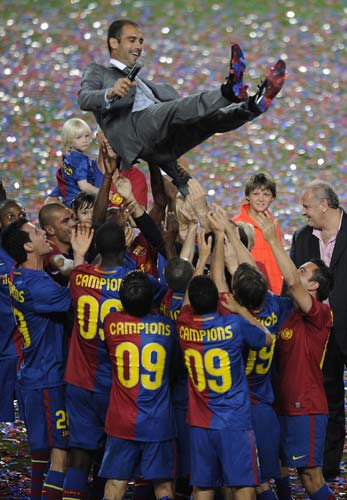Elite clubs on Uefa gravy train as Super Bowl knocked off perch

Your support helps us to tell the story
From reproductive rights to climate change to Big Tech, The Independent is on the ground when the story is developing. Whether it's investigating the financials of Elon Musk's pro-Trump PAC or producing our latest documentary, 'The A Word', which shines a light on the American women fighting for reproductive rights, we know how important it is to parse out the facts from the messaging.
At such a critical moment in US history, we need reporters on the ground. Your donation allows us to keep sending journalists to speak to both sides of the story.
The Independent is trusted by Americans across the entire political spectrum. And unlike many other quality news outlets, we choose not to lock Americans out of our reporting and analysis with paywalls. We believe quality journalism should be available to everyone, paid for by those who can afford it.
Your support makes all the difference.In a development that will have huge positive financial consequences for the elite in English football, the Champions' League final has overtaken the Super Bowl as the most popular televised event in global club sport.
An influential report, to be published tomorrow, but which has been seen by The Independent on Sunday, describes it as "an epochal moment in TV sports viewing trends", a "game-changer" in terms of Uefa's power to make money from TV and commercial deals and give more to clubs. The report has been compiled by Future Sports + Entertainment, an arm of leading international analysts Initiative, and details how the 2009 Champions' League final between Manchester United and Barcelona was the most-watched sports event worldwide. It attracted 109m viewers in its entirety, and "reached" 206m people, who saw at least part of it live.
The Super Bowl, traditionally the biggest TV event in global club sport, attracted 106m live viewers for the whole thing, with a reach of 162m. "That was Super Bowl's best ever figure, and as an event it's still growing," said Kevin Alavy, an Initiative director. "Extraordinarily, the Champions' League is growing faster, with room for further significant expansion."
That last remark is a reference to the Champions' League final moving to a Saturday this year, making it more convenient for the massive Asian market. "It's easier to stay up through the night if you're not working the next day," Alavy says.
What this means for English clubs in the tournament is more money. There is already hard evidence of it flowing in. Last season, Uefa paid £504.8m in prizemoney to the 32 clubs, split between "fixed" amounts, for reaching certain stages, and "market pool" amounts, based on TV revenues.
Manchester United made £33.1m directly from Uefa, more than any other club, before tickets and other match income. This season, on the back of last year's growth, Uefa's prize pot has grown almost 29 per cent to £650m. If United won this year's final, they would get as much as £47m from Uefa, a rise of more than 40 per cent.
10 most-watched events
1. Champions' League final 109m watched whole thing live at home (206m watched part)
2. Super Bowl 106m (162m)
3. Bahrain GP 54m (115m)
4. Men's 100m final 33m (95m)
5. Federer-Roddick 29m (89m)
6. Japan-South Korea (baseball) 27m (82m)
7. World Series game 6 26m (72m)
8. NBA finals game 5 26m (59m)
9. Masters final day 21m (49m)
10. South Korea v China (badminton) 19m (56m)
Join our commenting forum
Join thought-provoking conversations, follow other Independent readers and see their replies
Comments